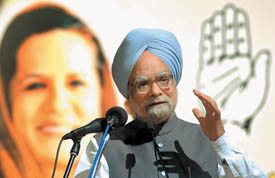|
DAILY NEWS ONLINE |
|
|
|
OTHER EDITIONS |
|
|
|
|
|
|
|
|
|
OTHER LINKS |
|
|
|
|
|
|
 |
Indian Premier Singh's tricky balancing act during first year in office
In his first year in office, the 72-year-old prime minister has had to use all his diplomatic skills to assure many more people who expect the distinguished academic to follow their advice. Those include communist allies opposed to economic reform, senior ministers accused by courts of corruption and Congress Party leader Italian-born Sonia Gandhi who manages election strategy, leaving many observers to view Singh as India's first technocrat prime minister with little political sway. By Singh's reckoning, he gets a six on a scale of 10 for managing the fortunes of the one-billion-plus population. The government's successes include a new patent law, a nuclear non-proliferation law and a freedom-of-information law that empowers citizens to challenge widespread corruption in Indian government. Still, Singh was rebuffed by communist allies on increased foreign investment and warned repeatedly he could lose their crucial support for pursuing market-friendly policies such as raising fuel prices. More importantly, efforts to cut poverty have not been successful for almost 300 million people who live on less than a dollar a day, a key vote bank for the Congress and its left-wing allies and which calls into question whether the government will complete a full five-year term. "I am not satisfied with what we have been able to do in terms of implementing new policy initiatives," the Oxford-educated Singh said in an appraisal of his government, days before its one-year anniversary on Sunday. "I do sincerely believe that we can do better. In the coming year, that will be our endeavour," he said. For the person credited with opening India's economy as finance minister from 1991-96, Singh has yet to usher in the kind of policies that could transform the lives of the vast majority of poor rural people in India, according to Indian independent political analyst Mahesh Rangarajan. "There is very little to show," Rangarajan says. "The core issues on which the Congress wrested power from the Bharatiya Janata Party (BJP), like rural employment and agriculture have not been addressed." To win power in May 2004 elections that led to the defeat of the Hindu nationalist BJP, the Congress agreed to a common governance policy with coalition allies to tackle rural poverty including a guarantee of 100 days employment a year for everyone. The government has not been able pass the employment bill, or other measures to increase health and education spending, Rangarajan says, adding that Singh's pledge of a "New Deal" for rural India has been "directionless". The bespectacled soft-spoken Singh, a Sikh known for his sky-blue turbans and white beard, was born in what is now Pakistan before the partition of the subcontinent in 1947. Singh is a member of India's unelected upper house, a position he was awarded for his long government service which included a stint as central bank governor and at the socialist-era planning commission. The jump to prime minister, usually held by someone elected to the powerful lower house, was unexpected. Singh was tipped to become finance minister again after the Congress Party won 145 seats in the 545-seat lower house of parliament on May 14. However, Sonia Gandhi, who was elected office to the lower house, declined the post of prime minister and selected Singh in a move political pundits initially hailed because of his well-earned reputation for probity and reform. Singh's government however depends on the support of 72 members of other parties and another 61 members of several communist parties who remain outside the cabinet. The setup has forced him into a tightrope walk on policies opposed by his allies such as selling state-owned companies. He also has to avoid upsetting members of the Congress Party who have longer-standing ties to Sonia Gandhi and represent voters directly. "He is lost and lonely," says Yashwant Deshmukh who runs an opinion poll agency called C-Voter. "I don't think that with a powerful parallel power centre like Sonia Gandhi, any prime minister can feel comfortable. People in the Congress and the ministers know who the boss is. Singh is sincere and hardworking so he is devoting all his time at the office desk." The prime minister's media adviser Sanjaya Baru, a former editor of the Financial Express newspaper, disputes that view. "His style has been consultative," Baru says. "People forget that he was leader of the opposition in parliament for six years pitted against the BJP." But the consulations have not worked, with the BJP boycotting the last two weeks of the budget session of parliament in May while using epithets like "incompetent", "invisible", "eunuch" and "dwarf" to describe Singh's leadership. They also stymied his tax policy by refusing to implement a nationwide sales tax in states they control - a tax they supported while in power. |
|
|
|
|
 Days after the Congress Party won an upset election victory with
left-wing allies in May 2004, Manmohan Singh was asked to calm investors
after India's stock market had its biggest one-day fall ever.
Days after the Congress Party won an upset election victory with
left-wing allies in May 2004, Manmohan Singh was asked to calm investors
after India's stock market had its biggest one-day fall ever. 



